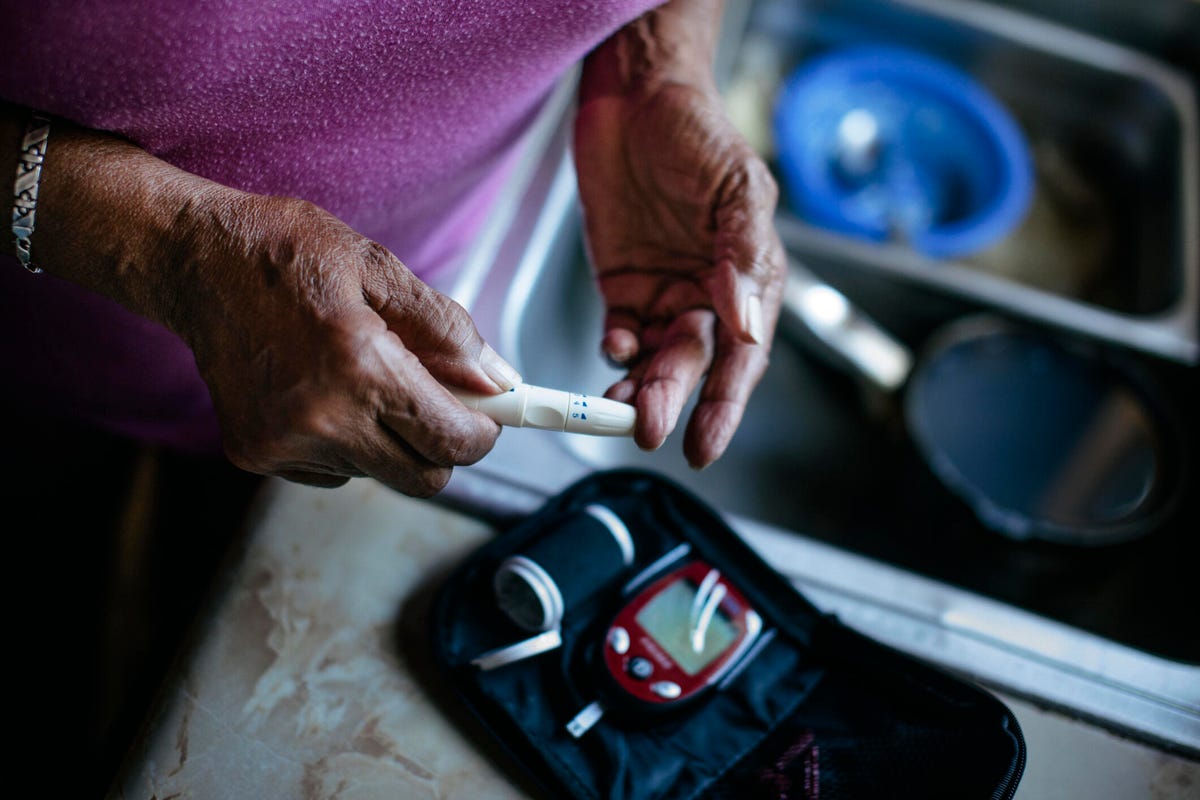A heat wave is sweeping across the US this week, with the Midwest and Northeast reportedly experiencing record high temperatures for the early summer, including in major metropolitan areas such as Chicago, St. Louis, New York, Washington, DC and Philadelphia, according to the National Weather Service's Weather Prediction Center.
While there are important things everyone can do to protect themselves during a heatwave, like staying cool and staying hydrated, heat affects everyone differently. Very common health conditions like high blood pressure and diabetes, and even the medications used to treat them, can exacerbate the effects of heat on the human body.
Here's what you need to know about underlying conditions and how to take extra precautions and prepare if you have them. As always, if you're in distress or have trouble breathing, call 911. It's also helpful to know the symptoms of heatstroke and whether heat exhaustion, which usually occurs before heatstroke sets in, has implications for your health and the health of your neighbors.
Read more: Severe weather coming: After hottest year on record, summer 2024 could be scorching hot
Respiratory diseases
People with health conditions that affect their lungs and airways, such as asthma or chronic obstructive pulmonary disease, are more affected by heat because hot weather can narrow their airways. If you have a respiratory illness, pay attention to air quality alerts in your area and limit your time outdoors on the hottest days.
What to do: If you have asthma or use an inhaler, keep it with you at all times and talk to your doctor if you think your symptoms are getting worse, according to the University of Pennsylvania School of Medicine. Be sure to write down how you store your inhaler, and never leave it in a hot car or anywhere that may overheat.
As Temple Health suggests, you can also plan your day around the hottest times of the day: If you need to run errands, try to head out in the morning or late evening, for example.

Very common health conditions such as diabetes and high blood pressure can make people more susceptible to the effects of rising temperatures.
Willie B. Thomas/Getty Images
Skin disorders
Extreme weather can cause an exacerbation of symptoms for people with eczema and rosacea. High temperatures are accompanied by dehydration, sweating, and increased sunlight, all of which can cause skin conditions to worsen. Also, people who are prone to acne may notice more acne in the summer because of the excessive sweat and the bacteria in it.
What to do: If you have eczema, follow these tips from the American Academy of Dermatology for the summer months.
To keep skin moisturized (and reduce inflammation), try to shower once a day in lukewarm water for no more than 10 minutes. If you sweat or need to shower again, use cool showers. When possible, use fragrance-free soaps, shampoos, and laundry detergents; sweating can make those who are sensitive to fragrances and dyes even more sensitive. (And avoid using too much soap in general.) Wear loose-fitting clothes.
If you're prone to acne, make sure you shower and wash off often, especially after exercising or sweating in hot weather, because the buildup of bacteria and sweat can make anyone prone to acne.
If you have a skin condition, pay particular attention to the ingredients in your sunscreen; the National Eczema Association recommends mineral-based ingredients.
Read more: How to know if you have heat stroke
Diabetes
According to the Centers for Disease Control and Prevention, about 11 percent of Americans have diabetes, and people with both type 1 and type 2 diabetes are more sensitive to heat than others.
Diabetes can cause complications that inhibit the functioning of sweat glands, which can impair the body's ability to cool itself down well. Diabetes can cause dehydration (which is a very common symptom of diabetes and shouldn't be overlooked), exacerbating an already common problem in the summer. Plus, according to the CDC, high temperatures can change the way your body uses insulin.
What to do: According to the CDC, try to avoid sunburn whenever possible, as it can raise blood sugar levels. To prevent sunburn, wear sunscreen, a large hat, and loose, protective clothing when possible. The CDC also recommends not going barefoot on the beach. (Some people with diabetes have nerve damage in their feet that makes them less able to sense heat, pain, and other sensations in their feet.)
To stay hydrated, try to limit your alcohol and caffeine intake on hot days. If you use insulin, store it according to instructions and avoid extreme temperatures (PDF), or the insulin may lose its effectiveness.
Read more: Eat these 6 expert-approved foods to stay hydrated
Heart disease and high blood pressure
Hot weather can put extra strain on your heart (PDF), which can be problematic if you have cardiovascular disease. People with high blood pressure are also more likely to suffer from heatstroke or heat exhaustion. Plus, some common medications people take for the heart or blood pressure, like beta-blockers, diuretics, and ACE inhibitors, can affect how your body responds to heat.
How to avoid: According to the Mississippi State Department of Health, avoid activities that stimulate the body or raise blood pressure, such as caffeine or strenuous exercise outdoors in hot weather. As always, make sure to stay hydrated.
You can also take advantage of summer fruits, including fresh garden vegetables, to boost your nutrition and promote a more heart-healthy diet.
As with diabetes, use the hot weather as an excuse to get your blood pressure checked and managed. High blood pressure is very common, affecting about half of all U.S. adults.
Read more: 10 tips to stay cool this summer even when sleeping without an air conditioner
pregnancy
High temperatures and air pollution can affect pregnancy, increasing the risk of premature birth, low birth weight and other undesirable outcomes, and can make pregnancy significantly less comfortable.
What to do: If you're pregnant, take normal measures to keep yourself and your internal temperature cool, like staying indoors as much as possible on hot days and staying hydrated. To stay nourished in the heat, BabyCenter recommends eating small, cool foods (like a fruit bowl or a hearty salad).

Research has shown that environmental stressors such as high temperatures and heat can affect pregnancy and fetal development.
Oscar Wong/Getty Images
Autoimmune disorders
Health conditions that have immune system causes can worsen in the summer. According to the Global Autoimmune Institute, high temperatures, UV rays, and humidity can trigger an immune response. Conditions like lupus, multiple sclerosis, and rheumatoid arthritis can be exacerbated by heat, whether they affect the joints (such as arthritis) or the nerves (such as multiple sclerosis).
What to do: The National Multiple Sclerosis Society recommends all the things you probably already do to stay cool, like staying in an air-conditioned space (the society also says that the cost of air conditioning may be tax-deductible if your healthcare provider writes a prescription to minimize symptoms). And if you exercise, they recommend gradually adding cold water to lukewarm water to cool down before and after exercise. In general, as the Global Autoimmune Institute says, beware of sudden temperature changes, which can also cause problems (for example, going from a very cold air-conditioned room to a sunny 90-degree-plus day). Give your body time to adjust.
If you have an autoimmune condition that affects the skin, such as psoriasis, and warm weather makes your condition worse rather than better, following skin care tips for eczema sufferers, such as using gentle soaps and limiting hot showers, can help prevent your condition from worsening.
Mental Health Symptoms
Extreme heat and climate change affect mental health in many ways, and often with overlapping effects. For example, many mental health problems are more likely to occur in people with other health problems or who are affected by factors that make them more susceptible to extreme heat, such as poverty.
People with schizophrenia may have difficulty regulating their body temperature, and some medications prescribed for mental health, such as certain antidepressants, medications to manage psychotic symptoms, and stimulants for ADHD, can also affect thermoregulation.
Many people may be at increased risk of depression, irritability and mania during the warmer months of spring and summer, and extreme heat has been associated with more reported harms and deaths.
What to do: If you're experiencing symptoms like depression, hopelessness, mania, or any kind of mood state that's affecting your quality of life, talk to your medical or health care professional about a plan for managing your symptoms during warm waves when symptoms may be worse, as well as a longer-term plan for getting help.
If you're taking prescription medications for any reason (whether for psychiatric symptoms or otherwise), it's a good idea to talk to your doctor about whether there are any additional steps you can take to stay safe.
If you are having thoughts of suicide or think someone you know is in danger, you should call 911 (or your local emergency number) or go to an emergency room. Explain that it is a psychiatric emergency and ask them to call someone trained to deal with these situations.



